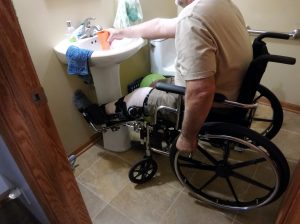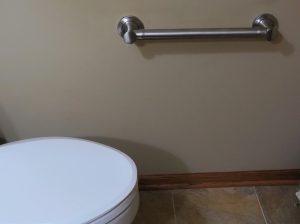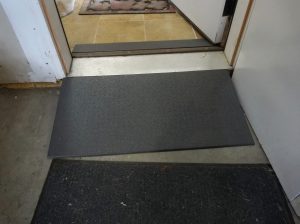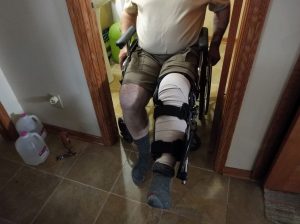Suddenly Dependent
How many times have we heard the phrase “walk a mile in someone else’s shoes”? Many times, as we’ve grown older, have we been taught the important lesson of empathy. And though compassion might be an easy commodity for some, actually being able to fully imagine your life as someone else’s, with all their difficulties and challenges, is not. The reality is much different as I found out after an incident with a ladder, a locked knee, and the uneven ground.
I have spent the last two months with a broken tibial plateau. Meaning, I’ve had to live with my leg in a locking brace sticking out in front of me. I thought I had understood what many of my customers went through as they have been diagnosed with ALS, MS, Parkinson’s, or spinal cord injuries. But I had no idea how frustrating it is to not be able to accomplish the simplest tasks to take care of myself, how I would feel robbed of my personal dignity.

Activities of daily living is a term used by OT’s and PT’s to describe the everyday things that we often take for granted, like brushing your teeth or entering a building. Things that we don’t often give a second thought—until life changes, and changes in an instant. Suddenly, one moves from complete independence to total reliance on others.
A couple of the first questions the OT asked after my surgery were about activities of daily living: where would I sleep if my bed is on the second story? Is there a zero-step entrance into my house? Did I have grab bars in the bathroom? Was the bathroom accessible with enough room for a wheelchair or a walker? Fortunately, we had remodeled our house for elderly parents a couple of years ago—but even so, we seemed to have missed the mark in some places.
Here are some of the interesting situations that I have run into on my adventure being a one-legged wonder:
1.) Trying to open a public bathroom door that did not have a handicap button without the support of my legs meant that I had no leverage and therefore needed assistance (especially heavy, spring-loaded doors that my healthy twenty-something year-old daughter had trouble opening.)
2.) Rolling up to a sink with your leg sticking out in front of you does not really work to wash your face or brush your teeth.
3.) Making a 90 degree turn to get into a handicapped bathroom stall that is only three feet wide is impossible.
4.) Using a toilet that is set too close to a wall or with limited space in front without any aids such as grab bars is dangerous.

5.) Rolling over uneven floors or substantial thresholds (1/2” or greater difference) is terrifying.

6.) Brushing your teeth or trimming your beard while trying to balance becomes an acrobatic fete.
I have a greater appreciation and empathy for those who must live in a wheelchair. Over the last couple of years, we have dealt with the guidelines and recommendations for disability, but now living with this reality helps us understand how important these really are. For instance —a five foot turning radius is imperative when your leg is sticking straight out in front of you.

The reality of my injury means I cannot bend my leg until my surgeon clears me. And then it’s months of rehab to get it back to what it was (or as close as I can get). It is an eye-opening experience to realize how many accessible “amenities” don’t work. In public places, the ADA Guidelines* are typically followed using the path of least cost and minimal changes to existing structures versus what will really work for those whom this ADA Act was intended to help. I now understand why so many have given up on traveling or going anywhere that the accommodations for accessibility are unknown.
In spite of the frustrations of the last couple months, it has been a great learning tool and one that will help us better explain to our customers how simple things like grab bars, handrails, and enough space to safely maneuver can make the difference. It’s the difference between dependence on others and a level of independence and restoration of personal dignity. This is just one of the reasons we do this kind of remodeling.
*Note the ADA Act does not apply to residential homes.
